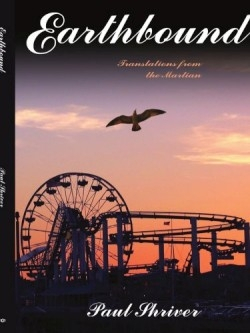Earthbound
Translations From the Martian
It is obvious that poet Paul L. Shriver loves words. He loves the sound of them and what they can do but most of all Shriver loves to play with words and he does this very well.
There is variety here to satisfy most every taste and though the poems are not all of equal quality the best works in this volume are alone worth the price of the book. Shriver’s words may dance and skip across the page or rant and rage against the acts and attitudes of the Bush Administration or muse upon a young woman’s bare midriff (not for young readers) but in each case the poet manages to transmit a deeper message in a way that could engage even those not inclined to enjoy poetry.
Anyone who has ever tried to learn to recognize bird calls from an audio recording that substitutes sound-alike words for the calls will laugh along with “If a Bird Calls Should I Answer?”: (“Why shouldn’t we gossip and Chat chat chat about / Peter—Peter—Peter who’s / Cheery Cheery Tiddly / Seedyl Query Queery Queer?”). Actors needing a monologue might consider the fast-paced “Trouble in Revolver City” based on “Trouble in River City” from The Music Man. “The Edge of Town” with its story of children growing up in a small Midwestern town with an obligatory “haunted house” would make a lovely children’s book should the poet care to find an illustrator. Those who tend to take themselves too seriously will learn their true purpose in “Purpose—Driven” where one’s reason for being here may just be to feed the cat—or if catless to feed the neighbor’s cat.
“A Professional” playfully describes the characteristics of the Australian sheepdog who does not know how to do a bad job of herding and protecting the sheep; Shriver’s offers some witty and gentle wisdom for their human counterparts as well. After listing the ways one should not treat the sheepdog who is a true professional Shriver describes what should be done: “What you DO with an / Australian Sheep Dog Is: / You give Him Enough / Food Water and a Warm Place to Sleep / And Then You Turn Your Back On Him. / You Wait Till He lets You know to turn around / And When You DO / All the Sheep will Be there / Right where they’re supposed to be.”
From limericks and song lyrics to haiku and long narrative verse Shriver’s work unabashedly entertains. The volume would benefit from the services of a qualified proofreader (“Australian” is spelled “Austrailian”) and the poet’s use of capital letters is an exaggerated and somewhat arbitrarily applied means to lend emphasis but reading a delicious poem like “Moonlight Fall—Snow” which paints an exquisite picture in sound nearly makes up for these smaller issues.
Reviewed by
Kristine Morris
Disclosure: This article is not an endorsement, but a review. The publisher of this book provided free copies of the book and paid a small fee to have their book reviewed by a professional reviewer. Foreword Reviews and Clarion Reviews make no guarantee that the publisher will receive a positive review. Foreword Magazine, Inc. is disclosing this in accordance with the Federal Trade Commission’s 16 CFR, Part 255.

